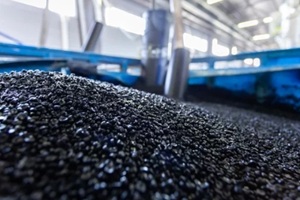April 21, 2025

Plastic is essential across industries, but its durability has led to a mounting waste crisis. With global production set to triple by 2060, improving plastic recycling is essential for sustainability. Despite growing consumer and regulatory pressure to enhance plastic recycling, current recycling rates remain dismally low, with only 9% of plastic waste being repurposed worldwide and an even lower rate of 5% in the United States.
To close this gap, the industry must adopt advanced sorting and processing technologies while adapting to stricter regulations. As innovation and policy drive change, businesses must rethink waste management, scale recycling solutions, and support a circular economy.
Plastics are manufactured from a variety of polymers, many of which are combined with additives, coatings, or multi-layered laminates to enhance durability, flexibility, or resistance to external elements. These modifications, while beneficial for performance, often make recycling impractical, as different polymers have unique melting points and chemical properties that complicate processing.
Contamination further exacerbates this issue, with food residue, dirt, and industrial chemicals frequently rendering otherwise recyclable plastics unsuitable for reuse. Black plastics, widely used in packaging and consumer goods, present an additional hurdle since many recycling scanners struggle to detect and sort them, leading to higher rejection rates and increased landfill disposal.
Limitations in recycling infrastructure create significant disparities in plastic waste management, particularly in rural and less densely populated regions where the financial viability of large-scale recycling facilities is a significant challenge.
The cost of transporting materials to processing centers often outweighs the economic benefits of recycling, leaving many areas without viable waste recovery solutions. Even in more urbanized and eco-conscious regions, existing systems frequently lack the advanced equipment necessary to efficiently process the shifting range of plastic products entering the market.
Without widespread investment in modernized sorting, processing, and collection capabilities, the industry faces continued inefficiencies that hinder large-scale progress in plastic recycling.
The complexity of plastic waste has long posed a challenge for recycling systems, but technological advancements are opening new possibilities for improving efficiency and expanding the range of materials that can be repurposed.
Artificial intelligence is revolutionizing the sorting process, addressing one of the most persistent inefficiencies in traditional recycling systems.
Innovative technologies are improving sorting accuracy by distinguishing food-grade plastics from non-food-grade varieties, helping to increase the quality and usability of recovered materials. In the Netherlands, researchers have developed a magnetic density separation technique that isolates plastics from metal contaminants, refining the sorting process even further.

Some of the most challenging plastics to recycle, such as multilayered laminates used in food packaging, may soon become more manageable thanks to new chemical approaches. For instance, scientists in the UK are testing green solvents capable of separating layers of different polymers, making previously unrecyclable materials viable for reuse.
Chemical recycling is also advancing in other areas, with companies like Eastman successfully converting plastic waste into syngas, a building block for new automotive parts.
Innovative recycling processes are extending beyond traditional manufacturing applications, unlocking new ways to repurpose plastic waste. For example, researchers from UC Riverside are using pyrolysis, a thermal decomposition method, to convert plastics into porous charcoal that can be used in agriculture to enhance soil water retention.
Chemical recycling is also making it possible to reprocess mixed plastics, which have historically been difficult to recycle, into high-value materials. Methods such as thermal decomposition and chemical recycling allow manufacturers to use recycled plastics as feedstock for new production, reducing dependency on virgin materials and minimizing the environmental footprint of plastic-based industries.
Join our PLASTICS Pulse newsletter today to receive updates on within the plastic industry while staying informed & connected.
Legislation aimed at increasing the use of recycled plastics in consumer products is accelerating at both national and international levels. In the European Union, new regulations require that all plastic packaging placed on the market contain post-consumer recycled content, reinforcing a circular economy approach.
Several U.S. states are following suit, with California, Colorado, and Oregon introducing ambitious policies that mandate the use of recyclable or compostable packaging by the next decade. These measures are designed to create a stronger demand for recycled materials while reducing reliance on virgin plastic.
At the federal level, the Recycling and Composting Accountability Act is seeking to expand access to recycling in underserved areas, particularly in rural communities where limited infrastructure has historically hindered collection and processing efforts.
With this legislation in place, policymakers are working to close the gap between urban and rural recycling capabilities, making sustainable waste management more accessible across the country.

Extended Producer Responsibility (EPR) laws are reshaping the way manufacturers engage with the plastics lifecycle by making them accountable for the collection and recycling of their products after consumer use.
Maine is leading the way with a new law, set to take effect in 2027, that requires producers to reimburse municipalities for recycling expenses. Oregon is also pushing corporate responsibility further with its Circular Action Alliance, a program that requires manufacturers to participate in material recovery efforts aimed at improving recycling systems and expanding collection services.
Advancing plastic recycling requires innovation, infrastructure, and regulatory alignment. With production rising and recycling lagging, the industry must rethink waste management. Integrating new technologies with changing policies can boost efficiency and unlock economic opportunities.
Joining PLASTICS, the Plastics Industry Association, gives businesses access to valuable resources, insights, and networking opportunities to stay ahead of industry shifts. With advancements in recycling technology and stricter regulations taking hold, staying ahead requires proactive engagement.
PLASTICS and the Future Leaders in Plastics (FLiP) Committee are devoted to supporting and encouraging the next generation of plastics leaders who will play a crucial role in the innovation, technology and future of the plastics industry. FLiP’s mission is to provide young professionals under the age of 40 the exposure, education and resources they need to build lifelong careers in plastics. Want to join? Want to get your employees involved? Email: flip@plasticsindustry.org